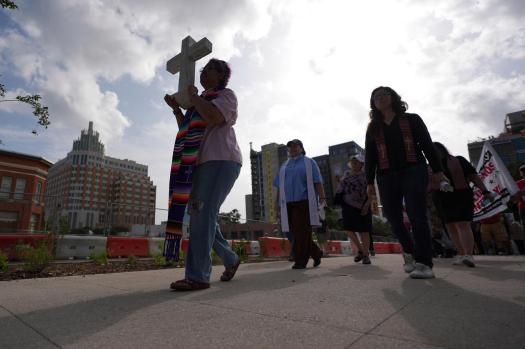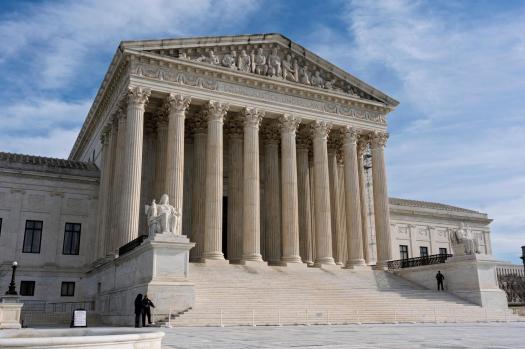By Durkin-Richer, Alana
Washington (AP) According to a recent letter highlighting the Trump administration’s extreme immigration strategy, the Justice Department is stepping up its preparations to deny citizenship to immigrants who have committed crimes or constitute a threat to national security.
Related Articles
-
UPenn to ban transgender athletes, feds say, ending civil rights case focused on swimmer Lia Thomas
-
Billions in grants for summer school, English instruction delayed during Trump administration review
-
Sanitation workers walk off the job after contract negotiations falter
-
Mayors, doctor groups sue over Trump s efforts to restrict Obamacare enrollment
-
Justice Department says 2 Chinese nationals charged with spying inside the US for Beijing
This administration has a history of identifying and pursuing individuals who are accused of cheating to obtain citizenship.
Advocates, however, are concerned about the public push and have charged the administration with attempting to exploit immigration enforcement for political ends. It’s coming under further scrutiny when a Republican congressman proposed denaturalization procedures for Democratic mayoral candidate Zohran Mamdani of New York City.
Here is an overview of the denaturalization procedure and the implications of the Justice Department’s memo:
A naturalized immigrant may have their citizenship revoked by the U.S. government if they are found guilty of naturalization fraud in a criminal court or if the government demonstrates through civil proceedings that they obtained their citizenship unlawfully through fraud or by falsifying or concealing information on their application.
For many years, suspected war criminals who falsified their immigration documents—most notably former Nazis—were the main target of the government’s denaturalization attempts. Between 1990 and 2017, the Justice Department filed just over 300 cases.
Operation Janus, a program that started during the Obama administration, broadened such efforts by attempting to find individuals who had previously received deportation orders but had used false identities to get citizenship and green cards.
An internal monitor revealed in 2016 that 315,000 fingerprint records belonging to immigrants who had been deported or convicted of crimes had not been included to a Department of Homeland Security database used for identity verification. More than 800 immigrants were deported under one identity but obtained U.S. citizenship under another, according to the same report.
Such inquiries were given greater importance during the first Trump administration, which established a Justice Department division devoted to denaturalization cases.
“Even so, there were still relatively few denaturalization cases because the administration lacked the resources to bring many in the midst of a barrage of legal challenges to immigration policies it had to defend against,” said Matthew Hoppock, a Kansas lawyer who handles denaturalization cases.
Assistant Attorney General Brett Shumate, the newly confirmed chief of the Justice Department’s Civil Division, revealed the campaign in a memo. According to Shumate, the department would give priority to cases involving individuals who could endanger national security, dangerous criminals, members of drug cartels and gangs, Medicaid frauders, and other fraudsters.
According to Shumate, the advantages of the denaturalization process include the government’s power to nullify the citizenship of those involved in war crimes, extrajudicial executions, or other grave violations of human rights; to expel naturalized criminals, gang members, or anyone convicted of a crime who continues to threaten the United States; and to stop convicted terrorists from entering the country again or leaving on a U.S. passport.
According to Hoppock, the letter essentially opens the door for the government to submit as many denaturalization cases as it can afford.
According to Christopher Wellborn, president of the National Association of Criminal Defense Lawyers, the memo’s ambiguous wording creates the possibility that any offense, at any moment, might be used as justification for denaturalization.
According to a statement from Wellborn, it is easy to envision a situation in which the government utilizes unsupported allegations of gang connection or a person’s criminal history to assert that citizenship was obtained unlawfully.
Some are concerned that the administration’s public campaign may incite anxiety among naturalized foreigners.
“We see a chilling effect on people applying for naturalization the more you talk about it and the more you frame it as we’re coming after your naturalization,” said Elizabeth Taufa, senior policy attorney and strategist at the Immigrant Legal Resource Center. even those people who are actually qualified to get naturalized.
The Trump administration has come under fire for allegedly utilizing immigration enforcement to target individuals based on their speech. One such instance is the deportation attempt against Mahmoud Khalil, an activist from Columbia University, for his involvement in pro-Palestinian demonstrations.
Our constant worries are whether they would target them politically and begin looking at people’s immigration records if they don’t like you or believe you disagree with the government. “Hoppock said.”
The worry is if they start searching through ordinary people’s immigration files for a T that is not crossed or an I that is not dotted so they can use it as a weapon, he said, adding that I believe the majority of Americans would be in favor of taking away someone’s citizenship if they obtained it through fraud and they are also a dangerous person.
Last month, the agency declared that it had successfully obtained the denaturalization of a man convicted of possessing evidence of child sexual assault.
According to officials, the British guy obtained U.S. citizenship through a clause that grants U.S. service members a road to citizenship after joining the U.S. Army. When asked if he had ever committed a crime or infraction for which he was not arrested on his naturalization application, he only mentioned a speeding ticket. In 2013, he was granted U.S. citizenship.
According to the department, he was convicted after being apprehended in Louisiana months later on substantial charges of child sexual abuse.
Shumate stated in a statement at the time that those who have illegally earned U.S. citizenship by hiding their crimes would not be protected by the laws designed to facilitate citizenship for courageous men and women who enlist in our country’s armed forces. The Justice Department will find out and pursue you if you commit severe crimes prior to becoming a U.S. citizen and then fabricate them during the naturalization process.











